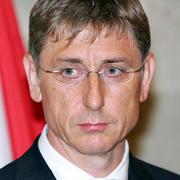ROUNDUP: Prime Minister Gyurcsany quits as Socialist Party leader
 Budapest - Prime Minister Ferenc Gyurcsany quit as head of the Hungarian Socialist Party on Saturday, after nominating Minister for Economy and Development Gordon Bajnai to lead an interim government.
Budapest - Prime Minister Ferenc Gyurcsany quit as head of the Hungarian Socialist Party on Saturday, after nominating Minister for Economy and Development Gordon Bajnai to lead an interim government.
Speculation has been rife over who will be Hungary's new prime minister since Gyurcsany said at his party's congress on March 21 that he would step aside to make way for a new government with a new leader.
Hungary is struggling through one of the worst economic crises of any EU economy, and Gyurcsany acknowledged that his deep unpopularity had made him an "obstacle" to reform.
At the same party congress, Gyurcsany was re-elected as leader of the Socialist Party by some 85 per cent of delegates. Now they will have to choose a replacement on April 5.
His latest move, to quit as head of his party as well as of the government, came towards the end of a day of fraught negotiation by party leaders over who should replace Gyurcsany as prime minister.
The Socialist Party leadership began the day with a debate over whether or not to back the former finance minister Lajos Bokros.
The Socialist government is a few seats short of a majority and need the support of the liberal Free Democrats, a small opposition party, for Gyurcsany's interim government to happen.
On Friday, the Free Democrats' leader, Gabor Fodor, told the Socialists that Bokros was the only potential nominee acceptable to them.
Bokros, an advocate of drastic public spending cuts, put an end to the matter himself on Saturday morning when he said was not prepared to accept Hungary's top political job.
"I am insulted by the notion that I would lend my reputation and credibility to a programme in whose success I have no faith," Bokros said.
The economics professor was speaking at the opening of the European Parliamentary election campaign for the Hungarian Democratic Forum, a minor conservative opposition party for which he is standing.
Bokros joined a growing chorus of doubters who believe the governing Socialist Party's plan to avoid early elections by setting up an interim government is unworkable.
Democratic Forum head Ibolya David also joined the call for early elections on Saturday, saying her party was ready to put its policy plans before the public.
By the evening, the ball appeared to be in the Free Democrats' court once again.
If they agree to Gordon Bajnai - who is not a member of the Socialist Party - heading an interim government, then he could be voted in by parliament on April 14.
Gyurcsany set this date for a constructive vote of no confidence in his current government.
If, however, the Free Democrats reject Bajnai, then the pressure on the Socialists to give up and call an early general election can only increase.
The centre-right opposition party Fidesz has from the start refused to countenance an interim government, saying early elections are the only democratic solution to Hungary's political deadlock.
Recent opinion polls suggest Fidesz would comfortably form a new government if elections were called, while the Socialists would see their representation in parliament significantly reduced.
The Free Democrats and the Hungarian Democratic Forum would disappear after failing to garner the five per cent of votes needed to enter parliament, if the polls are correct. (dpa)